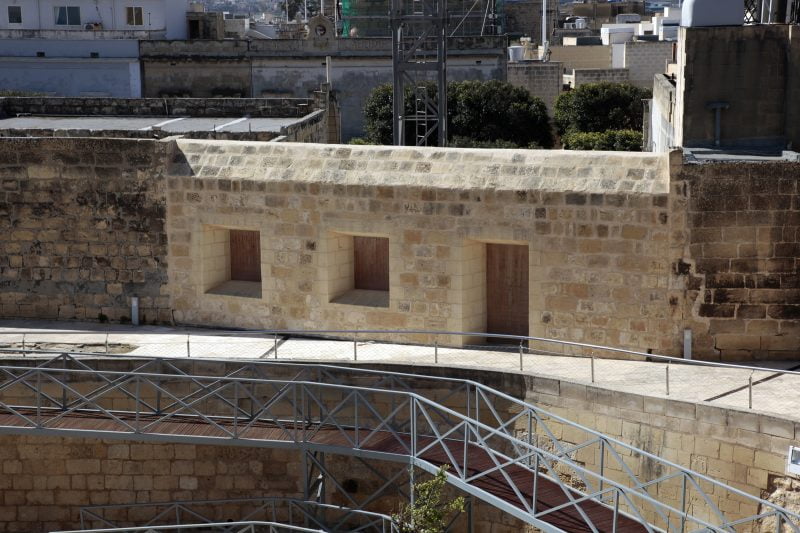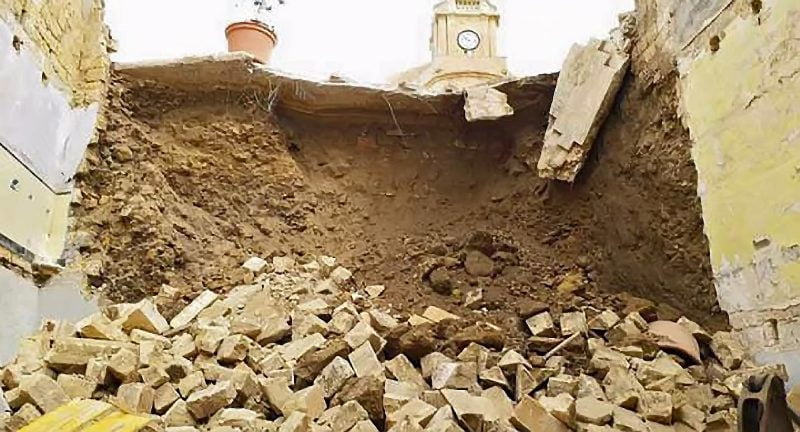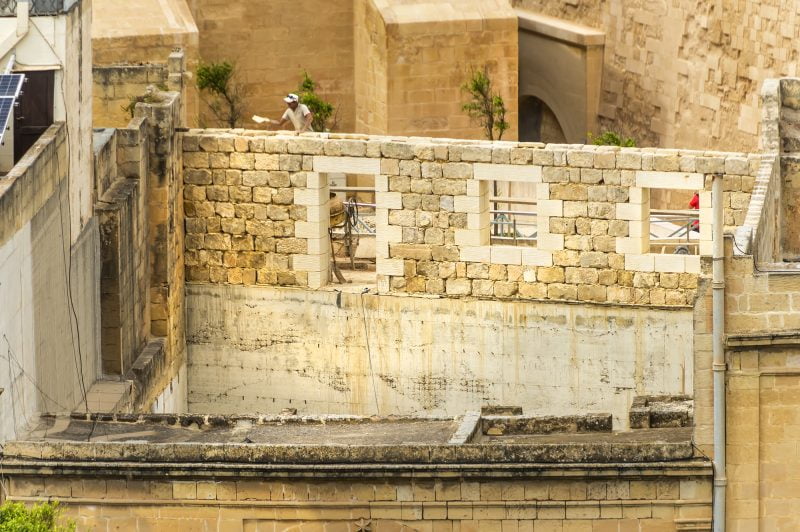The Lands Authority has sidestepped replying to questions on its lack of action against a developer who built a door and two windows onto the historic Citadel ditch in Gozo, which falls under the authority’s custodianship.
The apertures were opened by developer Mark Agius, who is involved in several controversial developments in Gozo, as part of a project that involves converting an old townhouse into a hotel.
Gozitan heritage NGO Wirt Ghawdex had protested vociferously when the Planning Authority issued a permit for the works on the house two years ago, saying the height of the building would obstruct the view of the medieval clock from Independence Square.
The NGO had also contested the new opening of apertures, which open onto what the Superintendence of Cultural Heritage described as the “counter-scarp of the covert-way in front of the ditch, an intrinsic part of the historical fortifications around the Cittadella.”

The door and two windows in the dividing wall between the house and the Citadel ditch. Photo: Daniel Cilia.
Wirt Ghawdex had pointed out that if the developer would eventually put out tables and chairs that “would mean an obstruction on the ramparts, which is today a popular walk around the Ċittadella.”
“Another important negative impact resulting from this permit,” it added, “is that it will now be pointless to secure the ditch by closing the gates at night since security can be breached through the hotel aperture by anyone at the hotel at any time.”
Land Authority provides no easement
In property law, anyone who wants to open apertures overlooking a property belonging to a third party must seek permission referred to as easement. In this particular case, the Lands Authority did not provide easement.
This means that, according to legal sources, the developer created what’s technically known as servitude and the Lands Authority had, and still has, the legal avenue to request the closure of the apertures.
The PA permit does not provide any form of legal immunity to the developer. It clearly states that it is granted, “saving third party rights” and does not “exonerate the applicant from obtaining any other necessary permission, license, clearance or approval required” from any government entity.
The Shift wrote to the Lands Authority, asking whether it has taken legal action against the developer for opening the apertures without its permission, and, if not, to explain what it plans to do about the apertures.
A spokesperson for the authority shifted the blame on the court, saying that “an inhibitory injunction to ensure that no damage is done to any part of the Citadel” had not been “upheld by the court.”
The precautionary injunction had been hastily filed after the wall in which the openings were made had collapsed one year ago. The wall stands between the ditch and the house.

The collapsed wall section one year ago.
The Lands Authority, together with the Gozo Ministry, had requested the court that the developer did not carry out any work that “could damage any part of the Citadel” as well as any “reparative works without the supervision of the architects of the Gozo Ministry and Superintendence of Cultural Heritage.”
The developer agreed to rebuild the collapsed wall section under the supervision of the respective architects mentioned in the injunction. This rendered the warrant of precautionary injunction void of purpose – the court said the developer’s agreement to reconstruct the collapsed parts under supervision meant that the authority’s request “no longer had any scope.”
Yet the issue of servitude has still remained unaddressed by the authority. A lawyer who specialises in property rights said the Lands Authority, as the legal title-holder of the Citadel ditch, can ask the hotel owner to close the door and windows.
Failing that, the authority can resort to the courts to seek an order to reinstate the wall to its previous state and close the apertures at the expense of the party who created the servitude. The law allows a party to seek legal redress on servitude for thirty years.
No mention of easement in Planning Authority report
There is also no mention of the potential issues surrounding easement or access to the ditch in the Planning Authority’s technical report, which assessed the application for the conversion.
This is in contrast with another application filed by the same developer one year later, in which the planning authority’s Sanitary Engineering Office – the office that vets an applicant’s compliance with health and sanitary regulations – questioned the opening of a house’s apertures onto the grounds of an adjoining block of houses.
The Sanitary Engineering Office queried whether the applicant “has the right of access and to open new apertures” – to which his architect declared in writing that the applicant has “right to access”.
In the case of the Citadel ditch, Wirt Ghawdex has doggedly made its objections about the apertures and the height of the building at all levels. In a meeting between civil society and government, in which then planning chairman Johann Buttigieg took part, Wirt Ghawdex president Giovanni Zammit had raised the objections to the permit. Zammit told The Shift that then Prime Minister Joseph Muscat had also told NGOs that the PA would go as far as revoke the permit if they found anything wrong with it.
The Shift had raised the issue of easement in that same meeting and asked about the lack of permission to open the apertures onto third-party property and whether the PA would be modifying or withdrawing the part of the permit on the opening of the apertures. The PA spokesperson said “the land title is not the prerogative of the Planning Authority” and that the PA “is not informed of any contestation.”
The spokesperson also said the PA had to wait for the outcome of the court case where both the applicant and architect have been prosecuted based on the findings of a magisterial inquiry following the wall collapse.
However, the issue of servitude is a matter of civil law and not something the criminal court can ordinarily rule on.
Works at a standstill
Meanwhile, residents in the neighbourhood have told The Shift that a crane assembled within the building has rarely been seen moving since August. Tourism operators and photographers have also been complaining about the crane ruining views of the Citadel.

A tower crane used in the development jars against the outline of the Citadel. Photo: Daniel Cilia.
When contacted, Agius did not give any reason for the crane’s inactivity. He said that works involving the crane would commence in May. Asked whether the crane’s inactivity was due to the ongoing court case in the criminal court, he asked for questions in writing – and then, in writing, he strenuously denied having “caused any damage to the Citadel’s historic fortifications” and that the “damage was to a party wall owned by us.”
The spokesperson for the Planning Authority said the authority had not stopped the works, which “could proceed.”













